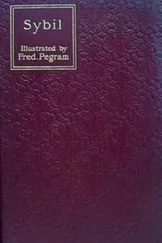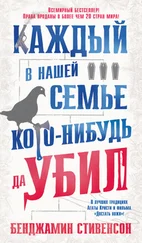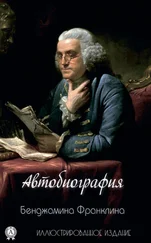No. It didn’t make sense. She was careful when she picked pockets, she had sharp eyes that took everything in. One month later, those eyes spotted Eddie again at a show in North Beach. This time, he wasn’t wearing his uniform, just a white crew neck and Dockers jeans. It took all of Klara’s focus to stay on script during her cup-and-ball routine, to ignore his crossed arms and closed smile, which she saw next at a Valencia Street nightclub. This time, she nearly dropped her steel rings. After the show, she strode toward Eddie, who sat on a round leather stool at the bar.
‘What’s wrong with you?’
‘Wrong?’ asked the cop, blinking.
‘Yes, wrong.’ Klara sat down on the stool beside him, which wheezed. ‘This is the third show you’ve come to. So what’s your problem?’
Eddie frowned. ‘I saw your brother’s picture in the paper.’
‘Fuck you,’ she said, and it felt so good, like alcohol burning out a virus, that she said it again. ‘Fuck you. You know nothing about my brother.’
Eddie flinched. He’d aged since she saw him outside the Mission Street police station. There were creases below his eyes and a fuzz of orange hair around his chin. His strawberry blond hair was mussed, as though he’d just woken up.
‘Your brother was young. I was hard on him.’ Eddie met her eyes. ‘I’d like to apologize.’
Klara stiffened. She wasn’t expecting this. Still, she couldn’t pardon him. She grabbed her duster and her duffel bag and walked out of the bar as quickly as she could without attracting the attention of the manager, a sleaze who never missed the opportunity to pressure her into a nightcap. Outside, it was shockingly cold, and hard-core punk streamed from the doorway of Valencia Tool & Die. Klara’s eyes smarted. It seemed unfathomable that Eddie was alive while Simon was not, and yet he was – alive and presently jogging after her, his eyes sharp with new determination.
‘Klara,’ he said. ‘I have to tell you something.’
‘You’re sorry, I know. Thank you. You’re absolved.’
‘No. Something else. About your show,’ said Eddie. ‘It’s changed me.’
‘It’s changed you.’ Klara chortled. ‘That’s sweet. You like the dress I wear? You like the way my ass looks when I spin?’
He grimaced. ‘That’s crass.’
‘It’s honest. Do you really think I don’t know why men come to my shows? You think I don’t know what you get out of it?’
‘No. I don’t think you know.’ He was wounded but held her gaze with a stubbornness that surprised her.
‘Okay, then. What do you get out of it?’
He opened his mouth just as the door to the Die expelled a clot of punks, who paused against the empty storefront to smoke. Their heads were shaved or garishly dyed, and chains hung from their belts. In comparison, Eddie looked painfully conventional, and he paused with discomfort. Years ago, Klara might have felt sympathy for him – for anyone at all – but by now her sympathy had been exhausted. She turned and walked swiftly toward Twentieth Street.
‘When I was a kid,’ said Eddie, to her back, ‘I was a fiend for comic books. The Flash. The Atom. You name it. I’d see the Green Lantern when I looked at the sky. If I passed a fire, I knew it was Johnny Blaze. I thought my wristwatch was Jimmy Olsen’s; hell, I thought I was Jimmy Olsen. “Hallucinations,” my father said. “That’s what they are.” But they weren’t. They were dreams.’
Klara crossed her arms, hugging her jacket closer, but she stopped walking. She stared straight ahead as Eddie caught up and came around to face her.
‘Of course, I couldn’t say that to my pops,’ he said. ‘We’re talking real old-school Irish Catholic, labor union organizer, member of the Ancient Order of Hibernians. “Do you hear me? Hallucinations,” he goes. “And I don’t wanna hear you say a word of it again.” “All right,” I said. And I didn’t. I went to Sacred Heart and I joined the force and I imagined I could still be like those guys. A hero, right? But I wasn’t like those guys. I was a man, or less than – a pig. I hated the kids and the gays and the burnt-out hippies, all the people who hadn’t worked as hard as I had and still had it better than I did. People, I thought, like your brother.’
She was crying. It took nothing to make her cry. Next month, it would be one year since she lay in bed with Simon and watched him inhale for the last time.
‘I was wrong,’ said Eddie. ‘When I watched you, making a card appear out of nowhere or working those steel rings, I remembered the comics. How it was possible to be more than you were – more than you started out being. I guess one way to put it is you gave me faith. Another is that I figured maybe I’m not too far gone yet.’
For seconds, Klara could not speak. Finally, unbeknownst to her, she had reminded someone of magic. She had given Eddie faith.
‘You’re not screwing with me, are you?’ she asked.
Eddie smiled, a childlike smile whose guilelessness made her cry harder.
‘Why would I do that?’ he said, and leaned forward, keeping his hands in his pockets, to kiss her.
She stilled at the shock of it. She’d been kissed plenty of times, but only now did she see how intimate the act really was. She had barely spoken to anyone since Simon’s death; usually, it was too painful to even see Robert. Inside her, a flock stirred and flew toward Eddie, desperately. But when he pulled back to smile at her, a smile of delight and good fortune, her desperation turned to revulsion. What would Simon think?
‘No,’ she said, quietly. Eddie’s hand appeared behind her neck to draw her closer, because he had not heard her or because he had decided to pretend as much, and she allowed herself to be kissed by him for seconds more. In doing so, she could pretend to be a different kind of person: someone who kissed a man because she liked him, not because it made her forget the hard ledge of rock from which she hung, clawing.
‘No,’ she repeated, and when Eddie still did not let go she shoved him in the sternum. He grunted and stumbled backward. A 26 trundled down Valencia, dispelling a haze of exhaust, and Klara started after it. By the time the gas cleared, Eddie stood alone beneath a street lamp, his mouth hanging open, and Klara was gone.
That fall, during the High Holy Days, she returned to New York for the third time. Klara and Varya chopped apples for kugel, Gertie cooking the noodles, while Daniel told stories of life in Chicago. Varya, twenty-seven, had finally moved into her own apartment. She had started graduate school at NYU, where she was studying molecular biology. Her focus was gene expression: she assisted a visiting professor in removing mutated genes from fast-growing organisms – bacteria and yeast, worms and fruit flies – to see if this altered their likelihood of disease. Eventually, she hoped to do the same in humans.
At night, Klara climbed into bed with Zoya, who had, in her old age, developed a queenly indisposition to walking anywhere. With the cat on her stomach and Varya in the opposite bunk, she asked to hear stories of Varya’s work. It gave Klara hope: the match-strike of genetic expression and the infinite variables that could be used to adjust eye color, predisposition to disease, even death. She had not felt so close to her siblings in years, and everyone, even Gertie, seemed lighter. When Gertie suggested the Golds perform the kaparot before Yom Kippur, in which a live chicken is swung above the head while reciting from the Mahzor – ‘Children of man who sit in darkness and the shadow of death,’ she intoned, ‘bound in misery and chains of iron’ – Klara burst into laughter; the charoset in her mouth splattered Daniel’s shirt.
Читать дальше
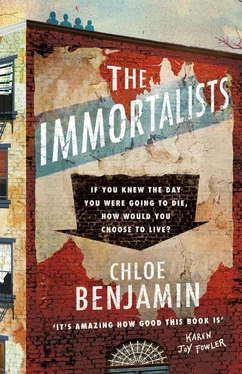

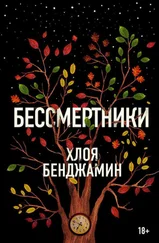

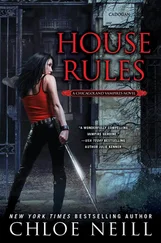
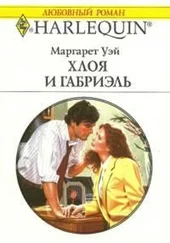
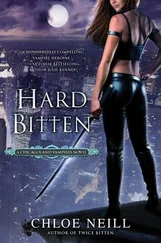

![Мелани Бенджамин - Госпожа отеля «Ритц» [litres]](/books/384861/melani-bendzhamin-gospozha-otelya-ritc-litres-thumb.webp)
